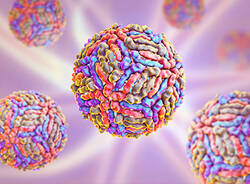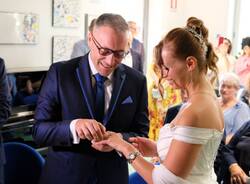People still die of AIDS
On the occasion of the world AIDS day, the ASL (local health authorities), the hospital, Informagiovani and the associations remind us of the importance of the prevention. Last year, the infections increased by 263%.
On 1 December we are going to celebrate the world AIDS day. A recurrence established in 1988 when the disease was considered the plague of the twenty-first century. Nowadays, after twenty years, the attention on the HIV virus has decreased. The precautions belong to a series of facts which are, however, less considered. The awareness of this subject is limited by young people and adults by the reason that; “ Today no one dies of AIDS!.”
The figures describe a different situation: today Lombardy registers an incidence of 2.5 new cases per 100,000 residents, while the incidence in Varese is slightly higher ( 2.8). Sick people have an average age between 35 and 50, a legitimate figures both for the ten-year latency of the pathology and for the drug actions that postpone the AIDS. Dr. Franca Sambo of the Department of Medical Prevention said; “ In 2012 in the province of Varese, 24 new diseases were registered, mostly on men (20). Clearly, more numerous, the contagions with 92 new diagnosis made it last year and an increase by 263% compared with 2011. The most popular way of transmission is the sexual one (78.8%), with an intensification among homosexuals .”
The biggest problem is the little knowledge that we have in regards to the disease effects; “There is a great indifference,” said Prof. Paolo Grossi, head physician of the Infectious Department at the Circolo’s Hospital, “we believe that precautions are unnecessary as nowadays AIDS can be treated.
We have had cases of people who intentionally have engaged in dangerous sexual practices to share everything with the partner. These are shocking matters that demonstrate how little we know about HIV.”
Today there are effective antiretroviral drugs, but the virus develops a “chronic-ill” life that obliges the subject to take drugs all their life, with a progressive deterioration of physical conditions.
Young people and teenagers, who adopt few preventive measures, pay little attention to the disease. “With our “Leonerd” projects, we try to give young people constant information about the disease but we also give them the addresses of clinics that are specialised in sexually transmitted diseases. And, if on the one hand public places are very interested when we give them our paper place mats, on the other hand young people are certainly more reluctant to inform themselves, as if AIDS remained a taboo or an argument that does not concern them. They affirm they know everything and they disappear,” explains Elena Emilitri, in charge of Informagiovani service.
They know everything but they do little confirms the cooperation “Lotta contro l’emarginazione” (Fight against the marginalisation) that promotes the culture of the health outside the youth centres. “From our surveys taken by 25 thousand young people, it emerged that 57.9% of the interviewed has had at least one unsafe sexual practice and that only 30% of people between 18 and 30 made a HIV test. The remaining 30% did it only for blood donation,” says Manuele Battaggi.
Investing on young people seems a real mission impossible. “It is better to involve all the family. We work together with schools but we realize that not only young people must be involved, but everybody must be aware of prevention.”
Among the young, for example, it is easier obtaining attention talking about illness in general, “We obtain more responses if we deal with illnesses like syphilis, gonorrhoea or genital herpes. This is why, usually, we start from these pathologies to get to deal with HIV,” said Paolo Bonfanti.
And precisely this lack of consideration of danger leads to undervalue check-ups. “They come to us when the illness is already obvious, and only because they have symptoms that the traditional medicines can’t cure; bronchitis that doesn’t pass or mononucleosis or lymphomas. They are admitted to hospital after different attempts of ineffective treatments made by their doctor. So the pathologies real origin is discovered. And sometimes, there’s nothing we can do about it,” reveals Doctor Grossi.
Superficiality but also changes in the common morals are the basis of the new contagions. “Loyalty isn’t a value. Both among the homosexuals and among the heterosexuals there is more freedom in the relationships. For this reason more attention is needed. However, HIV remains an illness whose social costs are very high; last year, as for the Lombard level, € 200 million for retroviral medicines were spent. Of those 23 are in the budgets of the area of Varese. Then, we have to deal with a society which, if on one hand reduces the risks, on the other hand is still led to discriminate sick people,” comments the head physician of infectious disease.
Sunday 1st December, therefore “Lotta contro l’emarginazione” (Fight against the marginalization) cooperative company will be in piazza Monte Grappa with an information stand from 10 a.m. to 4 p.m., while on the 29th and 30th November it will be raising awareness outside the public places of the area.
Therefore, AIDS still has to be scary; maybe it doesn’t kill everybody. But it kills.
TAG ARTICOLO
La community di VareseNews
Loro ne fanno già parte
Ultimi commenti
Adriana Andriani su Bogno, la Fondazione Sacro Cuore in liquidazione. Bini: "Non c'erano le condizioni economiche per proseguire"
Bruno Paolillo su Ottant’anni fa Hiroshima: la memoria della bomba che cambiò il mondo
PaoloFilterfree su Vigili del fuoco, organico solo sulla carta: Candiani denuncia l’abuso delle leggi speciali. "Vuote anche le case Aler in convenzione"
Alessandro Zanzi su Crescono le diagnosi di disabilità tra i minori di Varese: +500% in 10 anni
Lina Hepper su La Provincia di Varese studia un gestore unico dei rifiuti: "Una strategia a lungo termine per anticipare il futuro"
Cloe su Quattro eccellenze varesine premiate dai Travelers' Choice 2025 di TripAdvisor
















Accedi o registrati per commentare questo articolo.
L'email è richiesta ma non verrà mostrata ai visitatori. Il contenuto di questo commento esprime il pensiero dell'autore e non rappresenta la linea editoriale di VareseNews.it, che rimane autonoma e indipendente. I messaggi inclusi nei commenti non sono testi giornalistici, ma post inviati dai singoli lettori che possono essere automaticamente pubblicati senza filtro preventivo. I commenti che includano uno o più link a siti esterni verranno rimossi in automatico dal sistema.